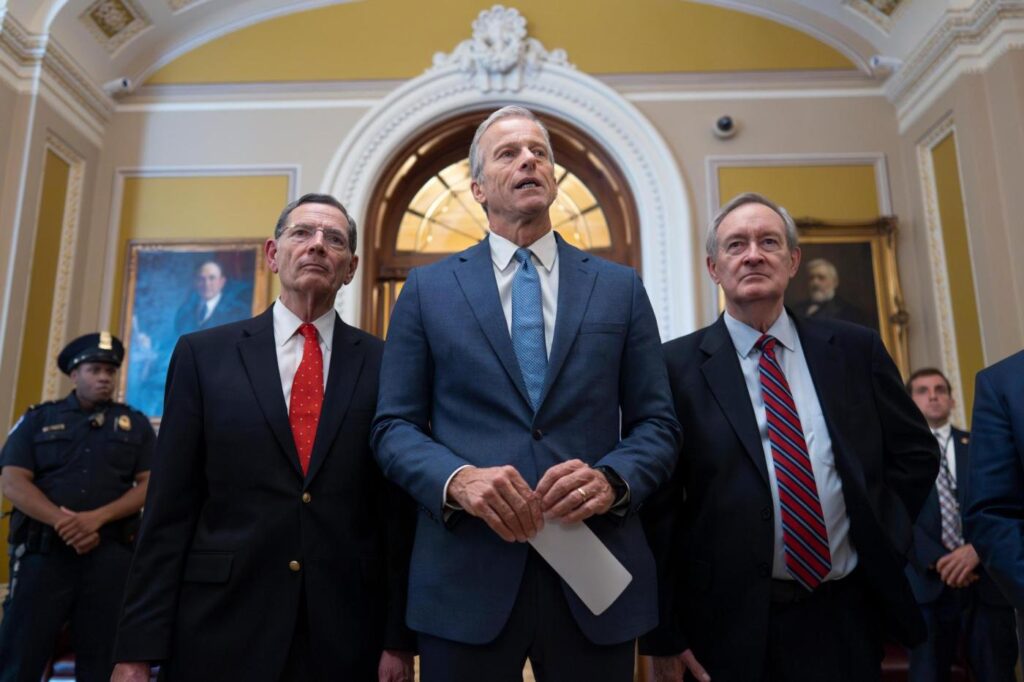WASHINGTON (AP) — Approximately 11.8 million adults and children could face the loss of health insurance if the Republican domestic policy package becomes law. This potential upheaval stems from the GOP’s “One Big, Beautiful Bill Act,” which aims to extract nearly $1 trillion from federal health care programs such as Medicaid, the Affordable Care Act (ACA), and the Children’s Health Insurance Program (CHIP) over the next decade.
The proposed legislation is poised to reverse years of increasing health insurance rates in the U.S., a trend accompanied by record federal spending on health care coverage. Currently, around 78 million individuals are enrolled in Medicaid, while 24 million participate in ACA marketplaces.
Impact on Medicaid and ACA Enrollees
Medicaid, a joint federal-state initiative, operates under various names across states, such as Medi-Cal in California and MassHealth in Massachusetts. Under the GOP plan, states will be required to verify Medicaid eligibility biannually, focusing on income checks. This increased scrutiny could disproportionately affect homeless or transient individuals, who might miss government notices, according to Martha Santana-Chin, CEO of L.A. Care Health Plan.
“The life experience of these individuals is not necessarily one that allows them the luxury of having to work through onerous paperwork,” Santana-Chin explained.
Historical data from Texas, where increased eligibility checks led to thousands of children losing coverage between 2014 and 2019, highlights the potential impact. Critics argue that frequent checks contribute to high uninsured rates among children.
Moreover, ACA marketplace enrollees will face more stringent income verification processes and potential penalties for discrepancies in reported earnings. This contrasts sharply with employer-based coverage, where re-enrollment is automatic unless opted out.
Challenges for Children’s Health Insurance
The bill also targets CHIP, allowing states to delay children’s enrollment if parents are behind on premium payments. Premiums can reach up to $100 monthly in some states, according to the Kaiser Family Foundation (KFF). Additionally, states may introduce waiting periods for children transitioning from private insurance to Medicaid.
The Biden administration previously prohibited such barriers, aiming to ensure continuous coverage for children. However, the GOP bill could reverse these protections, potentially increasing the number of uninsured children.
Immigrant Coverage and Work Requirements
Immigrants face additional hurdles under the proposed legislation. The bill narrows eligibility for ACA subsidies, affecting thousands of refugees and asylum seekers. States offering Medicaid to immigrants using state funds will receive reduced federal support, prompting some, like California and Illinois, to freeze or halt immigrant coverage programs.
The introduction of work requirements for Medicaid eligibility is another significant change. Adults aged 19 to 64 must work, volunteer, or attend school for at least 80 hours per month to qualify, with exemptions for those who are disabled, pregnant, or caring for young children. Michael F. Cannon, director of health policy studies at the Cato Institute, suggests this could dissuade those who do not prioritize Medicaid from enrolling, saving government funds.
“It can encourage people who don’t value Medicaid coverage not to sign up for it,” Cannon said. “And that saves the government money.”
However, many Medicaid enrollees already meet these criteria. Only about 8% report not working or being unable to find work. Yet, bureaucratic challenges, such as verifying employment without internet access, could lead to coverage losses, as seen in Arkansas in 2018.
Dual Eligibility and Administrative Hurdles
For individuals eligible for both Medicare and Medicaid, the GOP bill complicates enrollment by rolling back streamlined processes introduced by the Biden administration. Jennifer Tolbert, director of state health policy at KFF, warns that rescinding these simplifications could increase paperwork burdens, resulting in coverage losses.
“By rescinding these rules and no longer requiring states to make some of these simplifications, it’s likely that some people will lose coverage because they get caught up in these paperwork burdens,” Tolbert stated.
As the legislative process unfolds, the potential impacts of the GOP’s policy package remain a critical issue for millions of Americans. The debate continues over the balance between reducing federal spending and maintaining accessible health care coverage.
